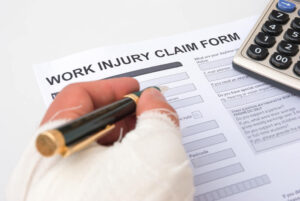
If you are employed in Ohio and sustain an injury at work or contract an occupational disease, you may have the right to claim workers’ compensation benefits. Workers’ compensation is a type of insurance that provides benefits to workers injured in workplace accidents or who develop a work-related illness. Ohio law requires businesses to obtain workers’ compensation insurance for all employees. It’s important to notify your employer of your injury to get the process started.
The Ohio workers’ compensation attorneys of Heller, Maas, Moro & Magill Co., LPA have put together some information below to explain how to advise your employer if you are injured at work, and what to expect from the workers’ comp claims process. If you have specific questions about workers’ compensation benefits or a disputed job injury claim, contact us for your free consultation.
Contents
Common Types of Work Injuries in Ohio
According to work injury statistics published by the National Safety Council (NSC), the most common types of work injuries include:
- Motor vehicle accident injuries – In 2019, approximately 40 percent of work-related fatalities and 6 percent of nonfatal work injuries were the result of motor vehicle accidents.
- Slip and fall injuries – Slips, trips, and falls on the same level or to lower levels accounted for 16 percent of work-related deaths and 27 percent of nonfatal work injuries involving days away from work throughout 2019.
- Overexertion injuries – Overexertion injuries such as repetitive strain injuries were the leading cause of nonfatal occupational injuries involving time away from work in 2019.
- Burn injuries – Throughout 2019, burn injuries caused by fires and explosions accounted for 2 percent of work fatalities.
- Struck by or against injuries – Contact with objects and equipment was the third-leading cause of nonfatal work injuries involving days away from work (26 percent) and the fourth-leading cause of fatal work injuries (14 percent) in 2019. This category also includes workers who were caught in or crushed by equipment or collapsing structures.
- Toxic exposure injuries – In 2019, 12 percent of work-related deaths and 4 percent of nonfatal work injuries involving time away from work were the result of exposure to harmful substances, such as dangerous toxins, fumes, or extreme temperatures.
- Injuries from acts of violence – Acts of intentional and unintentional violence by other people or animals accounted for 16 percent of work-related fatalities and 5 percent of nonfatal work injuries resulting in days away from work in 2019.
How Do You Tell Your Boss You Have an Injury?
If you sustain an injury on the job, you may be entitled to workers’ compensation benefits. One of the most important parts of filing a workers’ compensation claim involves notifying your employer and your health care provider about your work-related injury in a timely fashion. When you report your injury to your employer, make sure you:
- Don’t wait to get medical care if you need it – If you are seriously injured and require emergency medical attention, seek treatment immediately. You can apprise your employer as soon as you are in stable condition.
- Notify your employer in a timely manner – You are required to report your injury to your employer promptly. If you are too sick or hurt to do so yourself, you can ask a coworker or trusted friend to notify your boss for you. If your immediate supervisor is not available, notify human resources or your boss’s boss.
- Submit your notification in writing – When you report your injury to your employer, submit the notification in writing. Make sure you include the date and your full name and address.
- Keep a copy of your written notification for your records – It’s a good idea to keep a copy of the report for your own records. If anyone ever questions whether you followed proper reporting procedures, you will have documentation.
- Contact a workers’ comp lawyer as soon as possible – The sooner you have a trusted attorney in your corner, the better. When you choose to work with an experienced workers’ comp attorney, the attorney can guide you through the entire workers’ comp claims process and support you as your case evolves.
What Is the Employer’s Responsibility When a Worker Is Injured in Ohio?
After an employee notifies the employer of a work-related injury, the injured worker must report the injury to Ohio’s Bureau of Workers’ Compensation (BWC). The forms for the initial report, the First Report of Injury (FROI), may be submitted on paper or online.
Within 28 days of when the claim is filed, the BWC will decide to allow or deny the workers’ comp claim.

Who Pays the Compensation When an Employee Is Injured?
The party or parties that are obligated to pay compensation to injured workers can differ depending on the circumstances surrounding the injury. Employees may receive financial compensation from:
- Employer’s Workers’ Comp Insurance – If an injured employee files a workers’ compensation claim and it is accepted by the employer, the employer’s insurance administrator or the Ohio Bureau of Workers’ Compensation provides medical benefits and covers lost wages for the injured worker.
- Third Parties – If you sustained a work-related injury as the result of negligence on the part of someone other than your employer or a co-worker, you may have grounds for a personal injury lawsuit against the at-fault party.
Contact an Ohio Workers’ Compensation Attorney Today
If you were injured in an Ohio work accident, you need the support of a knowledgeable and compassionate workers’ compensation attorney. At Heller, Maas, Moro & Magill Co., LPA, we know what it takes to help injured workers access the care and benefits they need.
Contact us today to discuss the details of your occupational injury case in a free initial case review.
